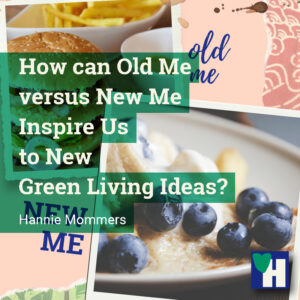
We were on a terrace having tapas with an acquaintance, talking about sustainability. At some point, he remarked he didn’t plan to do anything sustainable because “you either do it 100% or you don’t do it at all”.
It hit a nerve. Such nonsense, a statement like that. If we all do a little bit the world will turn into a better direction than where we are heading now.
Inspired by posts I saw with the title Old Me versus New Me, I have collected and come up with all kinds of ideas of old me/new me. There is bound to be an idea in this list that can inspire you as well.
Some of the links are affiliate links. As an affiliate associate, we earn a commission when you purchase any of the products offered through the shared links at no extra cost for you. This helps us maintain this website.
Table of contents
- 1 Old me versus new me
- 2 New green living ideas
- 2.1 Collect stuff -> Give stuff away
- 2.2 Plastic bottles -> Glass or metal bottle
- 2.3 Everything in garbage -> Composting
- 2.4 Composting -> Regrowing
- 2.5 Aloe Vera gel -> Plant in pot or garden
- 2.6 Buying all the new Eco-products -> Using what we have until it’s worn out
- 2.7 Meat from factory farming -> 1x a week organic meat
- 2.8 100% Zero waste or nothing -> All bits help
- 2.9 Teabags -> Filters
- 2.10 Rinse hands and vegetables under a running tap -> Bucket under the tap
- 2.11 Wilting herbs -> Freeze herbs with olive oil
- 2.12 Fruits and vegetables together -> Store separately
- 2.13 Throw away old textiles -> Make cleaning cloths out of them
- 2.14 Plastic bags -> Paper bags and cotton nets
- 2.15 Plastic bags -> Foldable bags
- 2.16 Drain vegetable juice -> Save for soups
- 2.17 Turnaround 180° -> Change step by step
- 2.18 Plastic shampoo bottles -> Shampoo bars
- 2.19 Sitting all day -> Walking every half hour
- 2.20 Walk occasionally -> Exercise 5 times a week
- 2.21 Throw away food -> Freeze or conserve food
- 2.22 Throw away old bread -> Wet and in the oven
- 2.23 Throw away old bread -> Make breadcrumbs out of it
- 2.24 Scouring pads -> Loofah
- 2.25 Plastic sponge -> Loofah
- 2.26 Halogen -> LED
- 2.27 Disposable plastic crockery and cutlery -> Spork and bamboo cups
- 2.28 Rotting fruit -> Juice, blend, or freeze it
- 2.29 Cotton ear swab -> LastSwab
- 2.30 Fastfood -> Homemade
- 2.31 Plastic highlighters -> Color pencils
- 2.32 White toilet paper in plastic -> Recycled in bulk and cardboard box
- 2.33 Single-use batteries -> Rechargeable batteries or electric devices
- 3 Final thoughts
Old me versus new me
Having a goal to bring about the desired change in yourself makes sense. Focus on small changes. In other words, embrace imperfect sustainability.
New green living ideas
Collect stuff -> Give stuff away
It is so easy to store things in a cupboard or a garage. In the end, nothing gets reused because there is no overview and we tend to forget what we have. If you don’t want to give stuff away, you can also sell it.
Related: How do we Personally Try to have a Sustainable Lifestyle?
Plastic bottles -> Glass or metal bottle
About 6-8 billion plastic bottles of bottled water were consumed in Spain in 2017. Spain is not even the country with the highest consumption of bottled water. Mexico and Thailand have that dubious lead. Instead of drinking from a plastic bottle, we can refill a glass or a metal bottle with (filtered) water.
Everything in garbage -> Composting
Many countries already have a separate waste collection system. Yet a lot can be composted at home so that our garden soil is made richer.
Related: How to Start Organic Composting at Home Immediately
Composting -> Regrowing
Another option is not to compost but to let parts of plants take root and put them back in the garden.
The bottom part of celery, onions, garlic, or leeks can take root in some water. Kernels and seeds can germinate and yield a new plant.
Aloe Vera gel -> Plant in pot or garden
Instead of buying a tube of Aloe Vera gel, it is easy to have an Aloe Vera plant in your home or garden.
Buying all the new Eco-products -> Using what we have until it’s worn out
If we want to change our lives, we always run the risk of going overboard. By immediately wanting to be 100% sustainable, there may be a tendency to remove everything from our house that is not good. It’s better to use what we have first or to repurpose things.
Meat from factory farming -> 1x a week organic meat
If everyone switched from daily meat consumption to organic meat once a week, the hunger problem could be solved. And it would have a hugely positive effect on biodiversity and climate.
100% Zero waste or nothing -> All bits help
Wanting to have everything perfect is stressful. Says this recovered perfectionist, LOL. Yet I know from experience that stress is only good if it comes from temporary exertion and is followed by prolonged relaxation.
Related: Easy Sustainable Living Ideas – Pick 1 or 2 and Start Living Green
Teabags -> Filters
Teabags are glued with plastic. When we still used tea bags, I later took the tea leaves out to compost without the bag. Fortunately, we now have metal filters and loose tea, which saves work and waste.
Rinse hands and vegetables under a running tap -> Bucket under the tap
We have a bucket in the kitchen sink to catch the water when we rinse our hands or clean the vegetables. When the bucket is full, it’s emptied on the compost heap or pot plants.
Wilting herbs -> Freeze herbs with olive oil
If you have a vegetable garden, there is always a moment when you have too much of something. Instead of allowing herbs to wilt, you can use ice cube trays to freeze herbs with some olive oil.
Related: Grow your Own Herbs Indoors or Outside for Quality Herbal Tea
Fruits and vegetables together -> Store separately
Fruit interferes with vegetables, so don’t store them together in the fridge or cupboard. If the fruit is not ripe, the process can be speeded up by putting the fruit in a paper bag with a ripe apple. Put the bag in a cupboard so that it is kept dark.
Throw away old textiles -> Make cleaning cloths out of them
Old t-shirts and underwear make excellent cleaning cloths that you can use for anything and everything.
Plastic bags -> Paper bags and cotton nets
Single-use plastics are bad for the environment and supermarket bags are the worst. Reuse paper bags or make cotton nets to take to the stores.
Plastic bags -> Foldable bags
In addition to paper bags and cotton nets, it is useful to have some folding bags in a shopper.
Drain vegetable juice -> Save for soups
Tom always drains cooked vegetables in a bowl and saves the liquid to make soup.
Turnaround 180° -> Change step by step
Instead of changing immediately and completely, be easy on yourself and make one small change at a time.
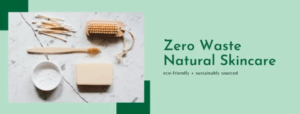
Plastic shampoo bottles -> Shampoo bars
Even in Spain, we can buy shampoo bars now in several shops. And online the choice is even bigger which makes it really easy to dump the use of plastic bottles.
Sitting all day -> Walking every half hour
Most of us sit in a chair and either look at our phones or watch TV the whole evening and during the day as well. Or we sit behind a computer. Sitting is the new smoking, it’s killing us!
Walk occasionally -> Exercise 5 times a week
It is especially good for the elderly to do strength training. In addition, simple exercise is fine, such as walking, cycling, or swimming.
Throw away food -> Freeze or conserve food
An awful lot of food is thrown away daily, either because it started to rot or because too much was prepared. Keep track of what you need in one week and if you accidentally have too much freeze or conserve it.
Related: Unlock the Benefits of Reducing Food Waste with a Personal Food Plan
Throw away old bread -> Wet and in the oven
Old bread is edible again when it has been moistened and placed in an oven at 200C for 5 minutes. You can also top it with cheese and put it under a grill.
If you think the bread has become too hard, break it in half and rub the pieces together to make breadcrumbs.
Scouring pads -> Loofah
Loofah or Luffa is a plant and looks a bit like zucchini. It belongs to the cucumber family and is a great sponge for cleaning.
Plastic sponge -> Loofah
Loofah is fine as a scrub sponge or shower sponge. If it falls apart, it can be put on the compost heap.
Halogen -> LED
Halogen light is an expensive light source. LED is better and comes in a variety of colors.
Disposable plastic crockery and cutlery -> Spork and bamboo cups
A spork is a spoon with teeth or a spoon with a fork at the other end. It takes up little space, making it easy to fit in a handbag or backpack.
Reusable bamboo coffee cups are light enough for on the go. And for the party at home, regular tableware is more festive than disposable plates.
Related: Throw an Eco-Friendly Party for Unique Birthdays or Holidays
Rotting fruit -> Juice, blend, or freeze it
Fruits are the cheapest in season, but if left too long they will rot. Make juice or a smoothie and freeze it. You can also blanch and freeze it.
Cotton ear swab -> LastSwab
Instead of using a throw-away ear swab, buy a reusable one like LastSwab and clean it with water and soap.
Related: Are there Easy Ways to Reduce Plastic Waste? LastObject Knows
Fastfood -> Homemade
Fast food or prepped food is usually too fatty, too salty, and too sweet. If you’re short on time during the week, make meals on the weekend that you freeze. Or buy a cookbook that contains dishes that can be prepared quickly.
Plastic highlighters -> Color pencils
A color pencil gives a different result than a highlighter. Yet, why would that be bad?
White toilet paper in plastic -> Recycled in bulk and cardboard box
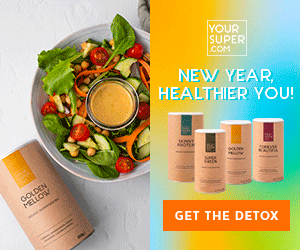
White toilet paper is bleached with chlorine which is bad for the environment. Often it is also printed with colored ink.
Related: 5 Eco-Friendly Reasons why we Should Buy Recycled Toilet Paper
Single-use batteries -> Rechargeable batteries or electric devices
The disposal of batteries is problematic. In addition, single-use batteries often leak, causing damage to the device.
Final thoughts
This is not a complete list. There are many more possibilities. The most important thing is our attitude towards the stuff we use. Do we see them as throwaway things or do we value their features and appearance?
Can you name any examples of Old Me/New Me? Tell us in the comment box below.

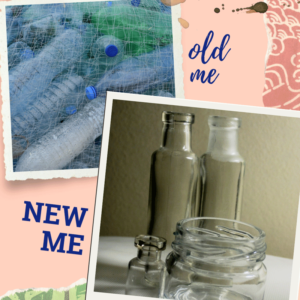
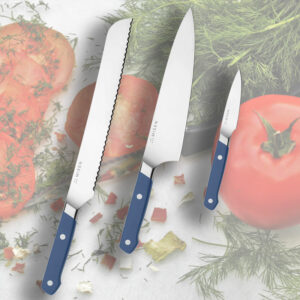
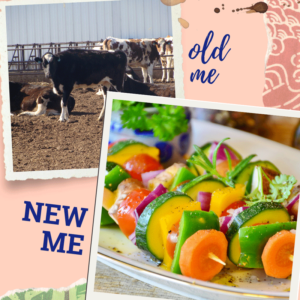
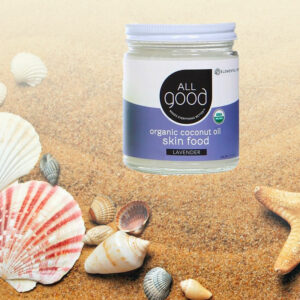
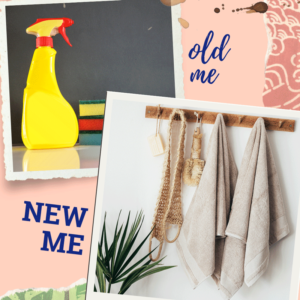
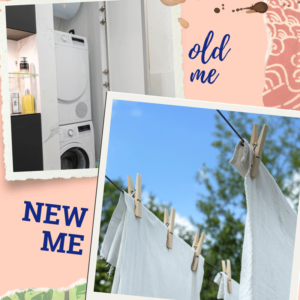
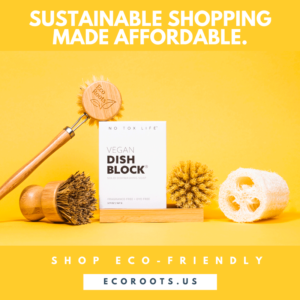
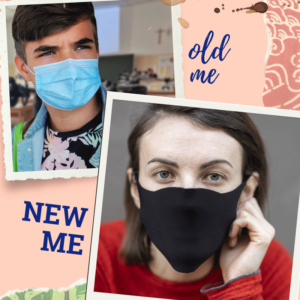
Loved this post! I think a lot of it arises from our childhood when some of us were taught to do something and to do it right. As in, when you make your bed or do your homework, to be all in. I hear the same excuse used by adults when it comes to eating healthier, to recycling or to living a balanced life. It’s pure nonsense and it leads to nowhere! I follow a flexitarian diet, mostly plant-based with the home cooked meat recipe here and there. Small steps really do matter!
Sounds like you’re doing great, Arianna. And you are so right, when we have the assignment (or the choice) to do all or nothing, chances are high we choose nothing. Small steps are so much better to keep up with and to maintain for an extended period.
Thanks for passing by and take care!